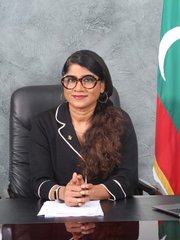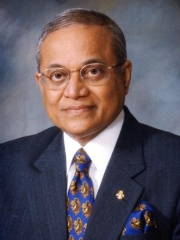
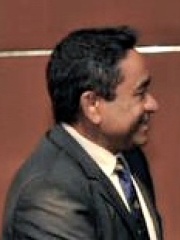
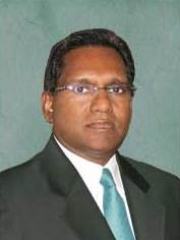
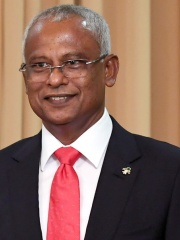
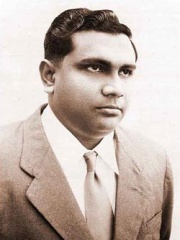
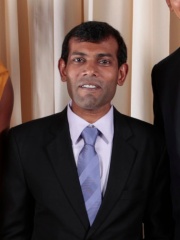
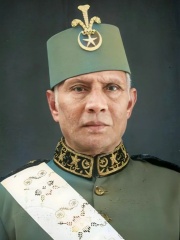
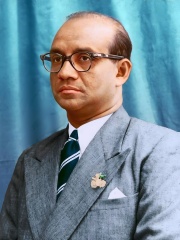
The Most Famous
POLITICIANS from Maldives
This page contains a list of the greatest Maldivan Politicians. The pantheon dataset contains 19,576 Politicians, 11 of which were born in Maldives. This makes Maldives the birth place of the 148th most number of Politicians behind San Marino, and Oman.
Top 10
The following people are considered by Pantheon to be the top 10 most legendary Maldivan Politicians of all time. This list of famous Maldivan Politicians is sorted by HPI (Historical Popularity Index), a metric that aggregates information on a biography's online popularity. Visit the rankings page to view the entire list of Maldivan Politicians.

1. Maumoon Abdul Gayoom (b. 1937)
With an HPI of 75.99, Maumoon Abdul Gayoom is the most famous Maldivan Politician. His biography has been translated into 52 different languages on wikipedia.
Maumoon Abdul Gayoom ( gah-YOOM; born Abdulla Maumoon Khairi; 29 December 1937) is a Maldivian politician, statesman and diplomat who served as the 3rd president of the Maldives from 1978 to 2008. He previously served as the Minister of Transport from 1977 to 1978, and as the Permanent Representative of the Maldives to the United Nations from 1976 to 1977. Gayoom is the longest-serving president in Maldivian history. Gayoom was born and raised in Malé. After serving as a lecturer at the Ahmadu Bello University in Nigeria, he returned to the Maldives in 1971 and worked as a teacher at Aminiya School. He was later appointed the manager of shipping department at the government. Gayoom was placed under house arrest in 1973 for criticising the policies of the then-president Nasir. He was later banished to Makunudhoo for four years but was released five months later as part of an amnesty following President Nasir's re-election for a second term. In 1974, he was arrested again for his continued criticism of Nasir's policies, but after 50 days in jail, he was freed and, in 1975, appointed as Special Undersecretary in the Prime Minister's Office. Gayoom later served as the deputy ambassador of the Maldives to Sri Lanka and was appointed deputy minister of transport under minister Hassan Zareer. After serving as deputy minister, he was appointed Permanent Representative of the Maldives to the United Nations in 1976. Following the vacancy of minister of transport, Gayoom was appointed to the position. As president Nasir chose not to seek re-election, a vote in the Citizen's Majlis which selected Gayoom as the candidate. In July 1978, Gayoom won the presidential referendum with 92.96% of the vote. During his administration, economic policies prioritised infrastructure development and tourism, which significantly boosted the nation's economic growth. He introduced educational reforms that expanded access to primary and secondary education and improved healthcare by establishing new health facilities. In response to political unrest and calls for greater democracy, Gayoom initiated constitutional reforms transitioning from a presidential to a semi-presidential system, intending to increase political participation and transparency. However, his presidency faced criticism for restricting political freedoms and suppressing opposition. The 1988 coup attempt prompted a focus on strengthening the armed forces. The 2004 tsunami had a profound impact on his administration, leading to the loss of 62% of the GDP and nearly two decades of development, which reshaped his policies and necessitated extensive reconstruction efforts. Despite challenges, Gayoom's long tenure, strict policies, and human rights violations, earned him a reputation as a dictator. Following his defeat in the 2008 presidential election to Mohamed Nasheed, which marked the Maldives's first multi-party elections, Gayoom adopted a low public profile. In 2018, Gayoom was arrested on charges of conspiring to overthrow the government as a part of the 2018 political crisis, and was sentenced to 19 months in prison for obstructing justice after refusing to cooperate with the police and judiciary. He was placed under house arrest in September 2018 due to health concerns and was released on bail later that month. He was acquitted of all charges in October 2018.

2. Abdulla Yameen (b. 1959)
With an HPI of 69.18, Abdulla Yameen is the 2nd most famous Maldivan Politician. His biography has been translated into 49 different languages.
Abdulla Yameen Abdul Gayoom (Dhivehi: ޢަބްދުﷲ ޔާމީން ޢަބްދުލް ޤައްޔޫމް; born 21 May 1959) is a Maldivian politician who served as president of the Maldives from 2013 to 2018. Yameen was elected president in the 2013 presidential election as the candidate of the Progressive Party (PPM), defeating Maldivian Democratic Party (MDP) leader and former president Mohamed Nasheed in the second round of the re-run, after the initial election was annulled. He was the second democratically elected president of the Republic of the Maldives. Yameen's presidential tenure oversaw a number of infrastructure development projects, such as airports and healthcare facilities, most of which were financed through loans from the Chinese government. His presidency was rife with allegations of human rights infringements and corruption. He left office on 17 November 2018 following his defeat in the 2018 presidential election to Ibrahim Mohamed Solih. Following his departure from office, Yameen was charged with corruption and money laundering in connection to the Maldives Marketing and Public Relations Corporation scandal, and was sentenced to 11 years in prison. He has since been freed from prison.

3. Mohammed Waheed Hassan (b. 1953)
With an HPI of 68.66, Mohammed Waheed Hassan is the 3rd most famous Maldivan Politician. His biography has been translated into 36 different languages.
Mohamed Waheed Hassan Manik (Dhivehi: މުޙައްމަދު ވަޙީދު ޙަސަން މަނިކު; born 3 January 1953) is a Maldivian politician who served as the fifth president of the Maldives from 7 February 2012 to 17 November 2013, having previously served as vice president from 2008 to 2012. He assumed the presidency following the resignation of President Mohamed Nasheed. An official Commission of National Inquiry report later concluded the transfer of power was legal and constitutional and that Nasheed's resignation was voluntary. During 2013, he ran for president but received about five percent of the vote in the first round. Following court‑ordered reruns and delays, he remained in office until the inauguration of Abdulla Yameen on 17 November 2013. In May 2025, President Mohamed Muizzu appointed Waheed as Special Envoy of the President.

4. Ibrahim Mohamed Solih (b. 1962)
With an HPI of 65.48, Ibrahim Mohamed Solih is the 4th most famous Maldivan Politician. His biography has been translated into 40 different languages.
Ibrahim Mohamed Solih (Dhivehi: އިބްރާހީމް މުޙައްމަދް ޞޯލިޙް; born 4 May 1964), popularly known as Ibu, is a Maldivian politician who served as the 7th President of the Maldives from 2018 to 2023. Solih was a parliamentarian for 15 years, he represented the Hinnavaru constituency and the Lhaviyani Atoll constituency during his tenure. He played a significant role in the democratic reforms of the Maldives and led the Maldivian Democratic Party (MDP) to victory in the 2018 presidential election. Solih was elected president on 23 September 2018 after winning the 2018 presidential election as the candidate for the Maldivian Democratic Party (MDP). His presidency focused on democratic governance, environmental sustainability, and strengthening international relations.
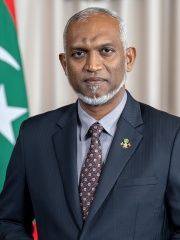
5. Mohamed Muizzu (b. 1978)
With an HPI of 61.90, Mohamed Muizzu is the 5th most famous Maldivan Politician. His biography has been translated into 40 different languages.
Mohamed Muizzu (born 15 June 1978) is a Maldivian politician and engineer who has been serving as the 8th president of the Maldives and leader of the People's National Congress since 2023. He previously served as housing minister from 2012 to 2018, making him the longest-serving housing minister in Maldivian history. Muizzu was the mayor of Malé from 2021 until his resignation in 2023. Born in Malé, Muizzu studied civil engineering in the United Kingdom and completed his PhD in 2009 at University of Leeds. He was appointed Minister of Housing in 2012 and served until 2018. He then became the Mayor of Malé. As a member of the People's National Congress, Muizzu was nominated as the presidential candidate following the imprisonment of former president Abdulla Yameen on corruption charges. Since Yameen was ineligible to stand for election, Muizzu was selected as his successor. He was the People's National Congress candidate in the 2023 presidential election, where he defeated the incumbent president Ibrahim Mohamed Solih. Muizzu has received the position of leader of the Progressive Congress coalition, as well as the Commander-in-Chief of the Maldives National Defence Force in 2023, making Muizzu the first democratic Maldivian president to hold the most positions in modern Maldivian history. Furthermore, he served as the Senior Vice President of the Maldives Development Alliance from 2013 to 2018, Deputy leader of Progressive Party of Maldives and Secretary General of the Adhaalath Party from 2010 to 2014. In the 2023 Maldivian presidential election, Mohamed Muizzu defeated seven candidates, receiving 101,635 votes in the first round and 129,159 votes in the second round. His campaign, branded as Dhiveheenge Raajje (The Nation of the Maldivians), emphasised national sovereignty, anti-corruption, and economic reform. The manifesto included promises to end foreign military presence and to enhance infrastructure and housing development. In the 2024 Maldivian parliamentary election, Muizzu's party secured a supermajority by winning 75 seats, surpassing the then–majority Maldivian Democratic Party (MDP), which had previously held over 60 seats in the People's Majlis. During his presidency, Muizzu has overseen policies including the expelling of Indian troops from the Maldives and ending secret agreements made by previous governments with other countries that allegedly threatened the independence and sovereignty of the Maldives. He also established closer relations with China. Muizzu has also focused on housing and structural development as well as the Government Policy and Legislative Reforms. In June 2024, he imposed a ban on Israeli passports, following the Gaza war and started national fundraising campaigns within the Maldives to demonstrate support for Palestine.

6. Ibrahim Nasir (1926 - 2008)
With an HPI of 59.28, Ibrahim Nasir is the 6th most famous Maldivan Politician. His biography has been translated into 26 different languages.
Ibrahim Nasir Rannabandeyri Kilegefan (Arabic: إبراهيم ناصر; Dhivehi: އިބްރާހިމް ނާޞިރު ރަންނަބަނޑޭރި ކިލޭގެފާނު; 2 September 1926 – 22 November 2008), , commonly known as Ibrahim Nasir, was a Maldivian politician who served as the Prime Minister of the Maldives from 1957 to 1968 under the monarchy, and later the first President of the Second Republic of Maldives from 1968 to 1978. Nasir served two terms (one term consisting of 5 years), then he decided to retire, even though the People's Majlis voted him in for a third term. Nasir adhered to the non-aligned ideology and was a staunch anti-imperialist. Nasir is remembered as an independence hero for guiding the Maldives to independence from the British Empire, he is also credited for establishing the tourism industry in the Maldives, as well as rapidly modernizing and developing the country and economy.

7. Mohamed Nasheed (b. 1967)
With an HPI of 54.91, Mohamed Nasheed is the 7th most famous Maldivan Politician. His biography has been translated into 46 different languages.
Mohamed Nasheed GCSK (Dhivehi: މުހައްމަދު ނަޝީދު; born 17 May 1967), also known as Anni (Dhivehi: އަންނި), is a Maldivian politician and activist who served as president of the Maldives from 2008 until his resignation in 2012. A founding member of the Maldivian Democratic Party, he subsequently served as the 19th speaker of the People's Majlis from May 2019 until his resignation in November 2023. He is the first democratically elected president of the Maldives and the only president to resign from office. Born in Malé, Nasheed was educated overseas before returning to the Maldives and becoming involved in political activism. He was first elected to Parliament in 1999 but was later forced to leave office, and was arrested and imprisoned several times during his early career. His arrest in 2005 prompted civil unrest. In the first round of the 2008 presidential election, he won 25% of the votes and later defeated incumbent President Maumoon Abdul Gayoom, who had governed the Maldives as president for 30 continuous years. As President, Nasheed played a role in drawing international attention to the threat of climate change to the Maldives. On 7 February 2012, Nasheed resigned amidst a political crisis. Protests by the opposition had begun after Nasheed ordered the arrest of the Chief Judge of the Criminal Court Abdulla Mohamed, which were later joined by police forces who refused to carry out the order. Nasheed characterised the circumstances of his resignation as a coup d'état, and that he was forced out of office. His successor, Mohamed Waheed Hassan Manik, disputed this, saying the process was constitutional, and created a Commission of National Inquiry to investigate. The Commission of National Inquiry, overseen by the United Nations and the Commonwealth of Nations, reported that there was no evidence to support Nasheed's version of events. Nasheed unsuccessfully ran for the presidency again in 2013. In March 2015, Nasheed was convicted under the Anti-Terrorism Act of Maldives for ordering the Criminal Court Judge's arrest while president, and was sentenced to 13 years at Maafushi Prison. Amnesty International described the conviction as "politically motivated", and the United States Department of State expressed concern at "apparent lack of appropriate criminal procedures during the trial". In 2016, he was given asylum in the United Kingdom, where he had gone for medical treatment. In November 2018, the Supreme Court of the Maldives overturned his conviction. Nasheed renounced his plans to contest the 2018 presidential election, citing legal obstacles and criticising the Election Commission's decision to reject his victory in a party primary poll. After his childhood best friend, relative, and party's candidate Ibrahim Solih won the election, Nasheed returned to the Maldives, and won the seat for the Central Mahchangolhi constituency in parliamentary elections the following year, subsequently taking office as Speaker of Parliament. On 6 May 2021, an assassination attempt was carried out against Nasheed near his home while he was getting into his car. He sustained serious injuries after an IED bomb that was stuffed with bearing balls as shrapnel was detonated near his home. He was treated in an intensive care unit in Germany, after undergoing multiple emergency surgeries. Maldivian authorities suspect it to be a terrorist attack by religious extremists. Three suspects were arrested.

8. Muhammad Fareed Didi (1901 - 1969)
With an HPI of 54.67, Muhammad Fareed Didi is the 8th most famous Maldivan Politician. His biography has been translated into 19 different languages.
King Muhammad Fareed Didi (Dhivehi: އަލްއަމީރު މުޙަންމަދު ފަރީދު ދީދީ, Al'amīru Muḥanmadu Farīdu Dīdī) , (January 11 1901 – May 27 1969), the son of the Sultan Prince Abdul Majeed Didi (Al Munthakhab Liarshi Dhaulathil Mahaldheebiyya), was the last Sultan of Maldives and the first Maldivian monarch to assume the title of "King" with the style of "His Majesty". He was the Sultan of the Maldives from 1954, until 1965, and King of the Maldives from 1965, until 1968. He was deposed in 1968 from the throne when the Maldives became a republic, and died the following year in Maldives.

9. Mohamed Amin Didi (1910 - 1954)
With an HPI of 54.14, Mohamed Amin Didi is the 9th most famous Maldivan Politician. His biography has been translated into 18 different languages.
Sumuvvul Ameer Mohamed Amin Dhoshimeynaa Kilegefaanu (Dhivehi: ސުމުއްވުލް އަމީރު މުހައްމަދު އަމީން ދޮށިމޭނާ ކިލެގެފާނު; 20 July 1910 – 19 January 1954), popularly known as Mohamed Amin Didi, was a Maldivian politician who served as the first president of the Maldives and as the head of government between 1 January 1953, and 21 August 1953. Amin Didi was also the principal of Majeedhiyya School from 1946 to 1953. Amin Didi was the leader of the first political party in the Maldives, Rayyithunge Muthagaddim Party. His political program included efforts to modernize the country, including the advancement of women, education in the Maldives, nationalising the fish export industry and an unpopular ban on tobacco smoking. Amin Didi took office during post World War II period, a time when the country was in widespread famine and exhausted resources.

10. Abdulla Shahid (b. 1962)
With an HPI of 49.94, Abdulla Shahid is the 10th most famous Maldivan Politician. His biography has been translated into 17 different languages.
Abdulla Shahid, (Dhivehi: ޢަބްދުﷲ ޝާހިދު; born 26 May 1962) is a Maldivian politician, diplomat, and public servant. He is currently the president-the second highest official of the Maldivian Democratic Party (MDP) and previously served as Minister of Foreign Affairs from 2018 to 2023. From 2021 to 2022, he served as President of the 76th session of the United Nations General Assembly, becoming the first Maldivian to be elected to the role. Shahid has held a range of senior positions in government and parliament over a four-decade career, including Speaker of the People's Majlis (2009–2014) and multiple terms as a Member of Parliament. He is known for his contributions to multilateral diplomacy, democratic governance, and constitutional reform in the Maldives.
People
Pantheon has 11 people classified as Maldivan politicians born between 1901 and 1978. Of these 11, 8 (72.73%) of them are still alive today. The most famous living Maldivan politicians include Maumoon Abdul Gayoom, Abdulla Yameen, and Mohammed Waheed Hassan. The most famous deceased Maldivan politicians include Ibrahim Nasir, Muhammad Fareed Didi, and Mohamed Amin Didi. As of April 2024, 1 new Maldivan politicians have been added to Pantheon including Mariya Ahmed Didi.
Living Maldivan Politicians
Go to all RankingsMaumoon Abdul Gayoom
1937 - Present
HPI: 75.99
Abdulla Yameen
1959 - Present
HPI: 69.18
Mohammed Waheed Hassan
1953 - Present
HPI: 68.66
Ibrahim Mohamed Solih
1962 - Present
HPI: 65.48
Mohamed Muizzu
1978 - Present
HPI: 61.90
Mohamed Nasheed
1967 - Present
HPI: 54.91
Abdulla Shahid
1962 - Present
HPI: 49.94
Mariya Ahmed Didi
1962 - Present
HPI: 41.70
Deceased Maldivan Politicians
Go to all RankingsIbrahim Nasir
1926 - 2008
HPI: 59.28
Muhammad Fareed Didi
1901 - 1969
HPI: 54.67
Mohamed Amin Didi
1910 - 1954
HPI: 54.14

